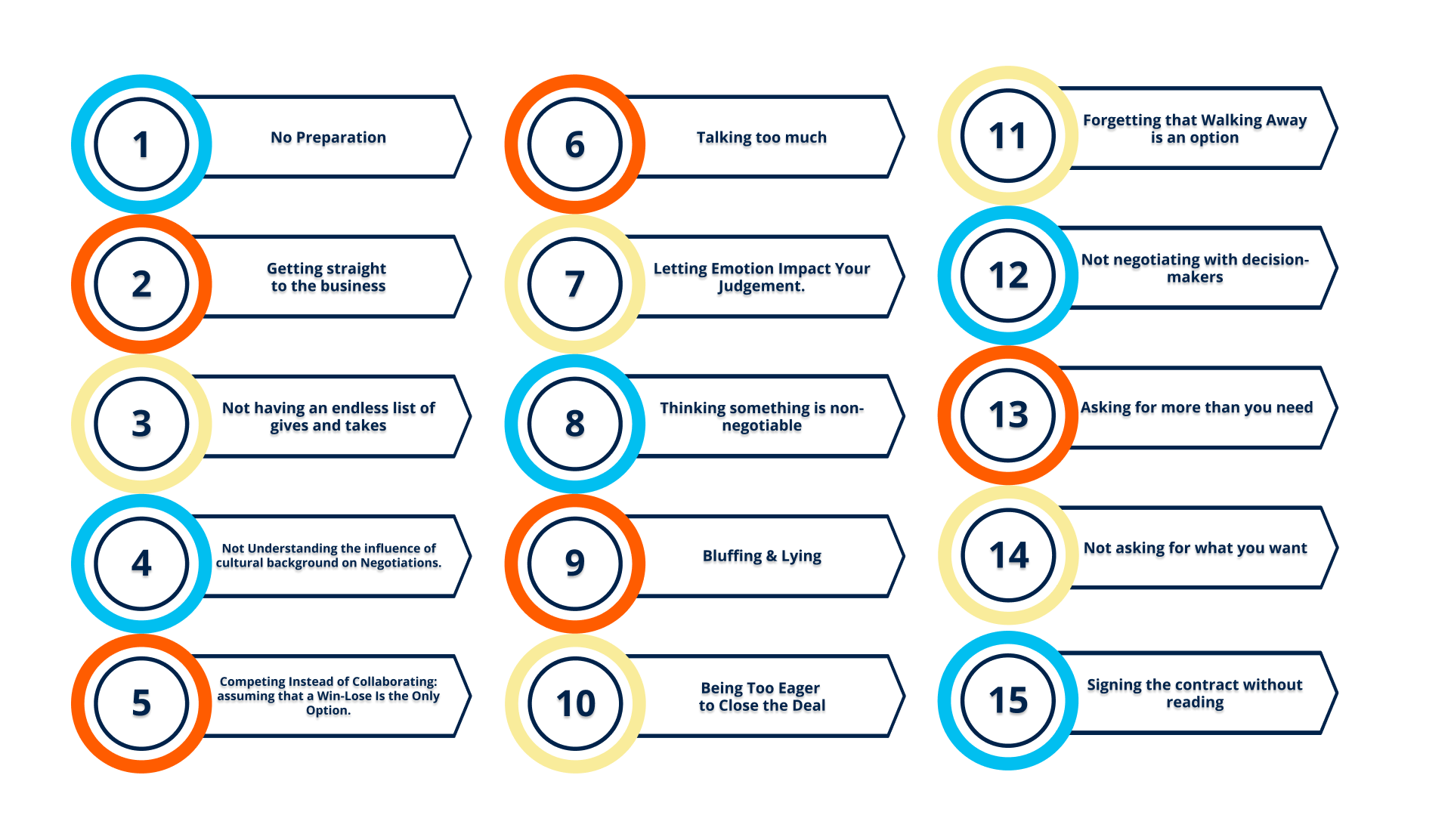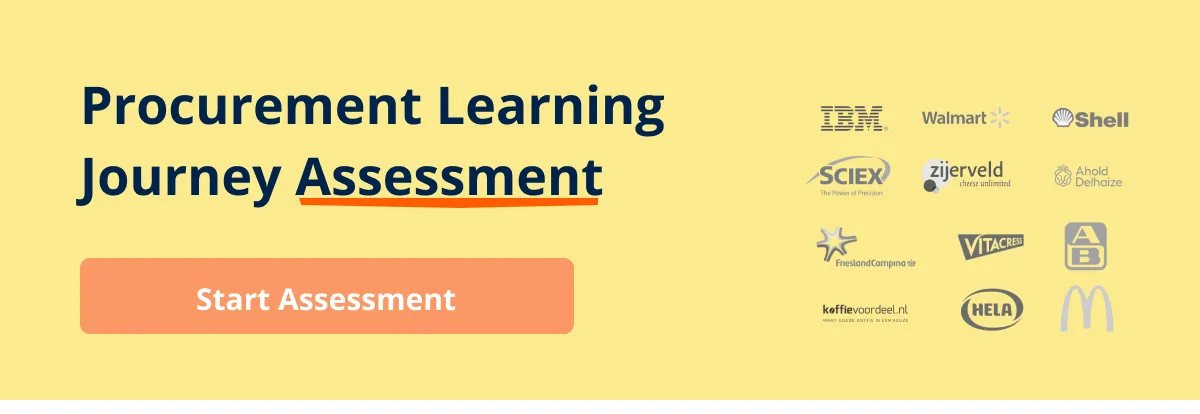Written by Marijn Overvest | Reviewed by Sjoerd Goedhart | Fact Checked by Ruud Emonds | Our editorial policy
Negotiation Mistakes — 15 Most Painful Mistakes We All Make
Table of content
- No Preparation
- Getting straight to the business
- List of Gives and Takes
- Influence of Cultural Background on Negotiations
- Competing Instead of Collaborating
- Talking too much
- Letting Emotion Impact Your Judgement
- Non-negotiable
- Bluffing & Lying
- Too Eager to Close the Deal
- Forgetting that Walking Away is an option
- Not negotiating with decision makers
- Asking for more than you need
- Not asking for what you want
- Signing the contract without reading
- Conclusion
- Frequently asked questions
Key takeaways
- Negotiation mistakes refer to actions that can make a difference in your negotiation, determining whether you land a great deal or walk away empty-handed.
- Establishing trust and connection with your counterpart makes negotiation collaborative.
- Create a comprehensive list of variables for negotiation to focus on variables that have low and high values.
Any negotiation can be stressful and cause anxiety, but the goal is usually quite simple: to discuss and ultimately agree on a deal.
Whether it’s an umbrella on the market, where to have dinner with your family, or a multimillion-dollar contract: our work- and private life is full of negotiations.
Successful negotiation relies on the use of strong negotiation tactics and an understanding of what an optimal outcome would look like for you and your organization. Your success starts with being aware of potential traps to avoid along the way.
Unlike strategy games such as chess, the most effective deals are a win-win proposition for all parties: aim for a final agreement in which both parties are satisfied.
The team of procurement tactics listed the mistakes people make during negotiations and how to avoid them yourself!
I have created a free-to-download negotiation preparation toolkit template. It’s a PowerPoint file that can help you to confidently navigate your next negotiation. I even created a video where I’ll explain how you can use this template.

1. No Preparation
Too often individuals or organizations rush into negotiations without proper planning. While preparation is the driver of success in any negotiation. Taking a ‘prepared’ seat at the power, confidence and creative solution thinking.
Before you start any negotiation, make sure you understand your position, but also the position of your negotiation counterpart. The more rigorous you are in preparing a detailed, specific understanding of your negotiation counterpart and their perspective, the better your negotiated results will be.
Learn more on how to understand your counterpart.
2. Getting straight to the business
Always remember: it’s not the company that decides to agree or disagree to a deal, people do. Many procurement managers forget that to get things done, you need to adapt to what works -and what does not- for the person on the other side of the table.
Make a connection! People who feel trusted and comfortable will behave more generously at the deal table.
Listen instead of talk and pay attention to the non-verbal communication of your counterpart to achieve insights into what works and what not.
3. Not having an endless listof gives and takes
Make sure you have an endless list of gives and takes. If you do not have this clear, you’ll never get the best result. So: focus before every meeting on what is most important for the person’s company I am negotiating with?
Make a long list with variables that are important for both you and the company you are negotiating with. The more variables on your list, the better. Rank them before you start negotiation in importance for you and your counterpart.
Best deals are created when you exchange the variables with a low value to you and high for the other versus the ones with a high value to you and low for the other one.
4. Not Understanding the influence of cultural backgroundon Negotiations
Understanding culture falls within the preparation stage of negotiation and is very important for identifying benefits and potential mistakes.
Understand how negotiations are established and managed in certain cultures, will help any negotiator around the globe getting better results.
This article will help you learn more about the delicate subject of cultural influence on negotiations.
5. Competing Instead of Collaborating:Assuming Win-Lose Is the Only Option
Negotiations that end up in a win-lose situation, are rarely the ones that build a sustainable model between companies and persons. Approaching negotiations with a win-lose mentality without exploring the possibilities raised by other interests will lead that you miss out on valuable opportunities.
Remember, there are always opportunities to build relationships in negotiations. Building trust through openness and transparency is the way to come to a solution that best suits both parties. To state it in negotiation language: both parties can have a piece of the pie – but working together can make the pie bigger.
6. Talking too much
Talking too much is a sure-fire way to kill a deal. Silence is a great tactic to diffuse the emotion and/or people with a temper. Generally, people are uncomfortable with silence. People feel they have to fill it, and usually what they fill it with weakens their position.
Use this knowledge in your advance in negotiations: most people can’t stand silence and are the first to fill it, very often with a concession. Silence also allows you thinking time, enables you to gain or regain position, and puts pressure on the other party.
7. Letting EmotionImpact Your Judgement
To let emotion out of your negotiation is easy to say, but not so simple to remember during a negotiation. Multiple studies have shown that negotiations that start with anger or confrontation have poor outcomes.
Emotions have a nasty habit of undermining negotiation skills and clouding judgment. Remind yourself to stay objective, and get the opinions of those who are not emotionally attached to the deal before you make a decision you might regret.
8. Thinking something is non-negotiable
Everything in life & any deal is negotiable. When you are aware of the fact that the terms for anything can be changed in your favor, a world of opportunity awaits for you.
Of course, there will be rules to respect with each deal on the table to help keep discussions but however, even rules are negotiable. They can be modified if you simply propose a solution.
9. Bluffing & Lying
Credibility is one of the most valuable assets you have as a negotiator. One of the quickest ways to lose it is to make threats that you don’t have the authority or conviction to make happen. Another way to destroy your credibility is by lying and making promises you can’t or won’t keep.
10. Too Eager to Close the Deal
Almost at a deal? Don’t close!!! Make sure to add one important new variable to the deal table in the final phase. Do not relax! Keep your ‘endless list of gives and takes’ up to date during the ongoing negotiation process.
Why? In most negotiations, the moment to achieve ‘unexpected’ results is in the final phase, where a logical psychological process ensures that people are more likely to give away things more quickly.
Remember, there is no such thing as a ‘fair deal’, but there are many new variables to include in the final stage of the process towards a deal. Purchase volume rebates, lump sums & growth bonuses are excellent examples.
11. Forgetting that Walking Away is an option
Too many negotiations take unnecessary long because of the absence of decision-makers at the table. Always ask yourself the question before you start any conversation: is my counterpart able to make decisions and to say yes to proposals? If the answer is no, don’t even start and walk away.
12. Not negotiatingwith decision makers
There’s no point in running a negotiation if the people around the table don’t have the authority to make a decision or agree to a deal. If you have the feeling your negotiation counterpart does not have any authority to close a deal: directly stop the negotiation.
13. Asking for more than you need
Although the Gap Partnership trains negotiators worldwide to open extreme, the team of Procurement Tactics has the belief that opening a negotiation with an extreme first offer is not only very ineffective, it can also make you look very disrespectful to the other side. If they don’t laugh at your offer and leave the negotiation directly, you will have to make large concessions to bring your demands back to reality, weakening your credibility and your position.
14. Not askingfor what you want
There is one key truth in negotiations: You must ask for what you want. Sounds simple enough, but in practice, it can often be daunting.
Negotiators naturally fear rejection or were taught not to be “greedy” as children but however, in business, rejection is never personal; it’s merely a reflection that you did not present a viable argument substantiating why you should get what you want. The offer is being rejected, not you, so keep emotions in check and re-calibrate your approach. The only way to master the art of rejection is to get rejected and keep asking.
When negotiating, make it a priority to ask for exactly what you want. Most of the time you will either receive what you want or an acceptable alternative.
15. Signing the contractwithout reading
Before you sign on the dotted line, it’s imperative you read what you are signing—regardless of the length of the wrap up of your deal. Make sure to read any agreement or contract in full to ensure you are not confirming terms you will regret and cannot undo.
Conclusion
Negotiations are an integral part of both professional and personal life, demanding effective strategies and awareness of potential pitfalls. This guide, compiled by the procurement tactics team, sheds light on common mistakes made during negotiations and provides valuable insights on how to avoid them.
From inadequate preparation to emotional influences and deceptive practices, the article addresses key aspects that can impact successful negotiation outcomes. Here’s a comprehensive overview of the key takeaways from the guide:
Frequentlyasked questions
Why is preparation essential in negotiations?
Proper preparation ensures understanding of both your position and your counterpart’s, empowering you with confidence, power, and creative solution thinking.
How does cultural background influence negotiations?
Understanding cultural nuances aids negotiators globally, helping identify benefits and potential pitfalls, fostering better results.
Why avoid a win-lose mentality in negotiations?
Negotiations built on collaboration rather than competition lead to sustainable relationships, emphasizing openness and transparency for mutual benefits.
About the author
My name is Marijn Overvest, I’m the founder of Procurement Tactics. I have a deep passion for procurement, and I’ve upskilled over 200 procurement teams from all over the world. When I’m not working, I love running and cycling.


